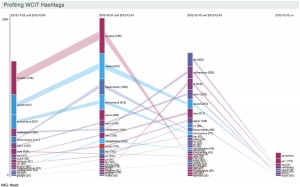[img: Noortje Marres, Mapping WCIT with Twitter: Issue and Hashtag Profiles, 2012]
Thirty years ago, the democratization of IT radically changed the way we access, generate and manage information. The Internet has amplified and accelerated this phenomenon, producing ever increasing amounts of “natively digital data” (Rogers, 2013). This has fostered numerous studies of online culture, where researchers have turned to user-populated platforms such as Twitter to detect the associative practices of novel communities, or to sites such as Wikipedia where recent studies compare the controversality of topics on different language sections of the online encyclopedia (Yasseri, 2012). Beyond these specific studies of web-based-media use, there are broader questions about what exactly are we studying when we analyze hyperlinks, online forums, websites, etc.? Furthermore, what are we doing when we access information through ranking systems provided by search engine algorithms (e.g. PageRank) that constantly evolve to take into account a user’s prior searches? The session aims to develop a reflexive understanding of using natively digital data as a resource for research.
[14h30-16h00] The seminar will start with a collective discussion of the articles (and video presentation) listed below. There will be a brief presentation and comments on the texts provided by Alexandre Hocquet and Tao Hong to help launch the discussion.
- Marres, N., & Weltevrede, E. (2013). Scraping the Social? Journal of Cultural Economy, 6(3), 313–335. doi:10.1080/17530350.2013.
772070 (link) - Yasseri, T., Sumi, R., Rung, A., Kornai, A., & Kertész, J. (2012). Dynamics of Conflicts in Wikipedia. PloS ONE, 7(6), e38869. doi:10.1371/journal.pone.
0038869 (link) - Kelty, C. (2014). The fog of freedom. In Gillespie, T., Foot, K., and Boczkowski, P., editors, Media Technologies: Essays on Communication, Materiality, and Society. MIT Press, Cambridge, MA. Video link of presentation of text: https://www.youtube.com/
watch?v=ihY0exiwkn8
[16h00-16h15] Pause
[16h15-18h00] Noortje Marres, Senior Lecturer at Goldsmiths University of London will be the guest for this session and present The Ambiguity of Social Media Research: Re-mediating Science and Technology Studies. Her talk will address a distinctive problem in social media research, namely the inherent ambiguity of its object. Of much social media research the question can be asked of its practitioners: are they studying society or technology? Not just the objects, but equally the methods of social media analysis are marked by ambivalence. They are of uncertain provenance, invoking methodological traditions in qualitative and quantitative research at once, and leaving it unclear whether they derive from media culture or from social research. Drawing on work in science and technology studies, Marres will argue that this ambiguity of social media research should not be regarded as a problem-to-be-solved. Instead, the confusion creates opportunities for understanding and can be deployed to generate insight in/as social media research. One could even say that social media research fails when the ambiguity of its object and methods is solved too quickly.
The seminar is open to all. If you are interested in participating, however, please sign up on our website here.
Ambiguity os social media research, re-mediating science and technology studies : Noortje Marres – Goldsmiths University of London (1 of 2)
Ambiguity os social media research, re-mediating science and technology studies : Noortje Marres – Goldsmiths University of London (2 of 2)


Permalink
Videos 1/2 and 2/2 are the same
Permalink
Thanks for pointing it out! And sorry about that. We’ll get it fixed as quickly as we can.